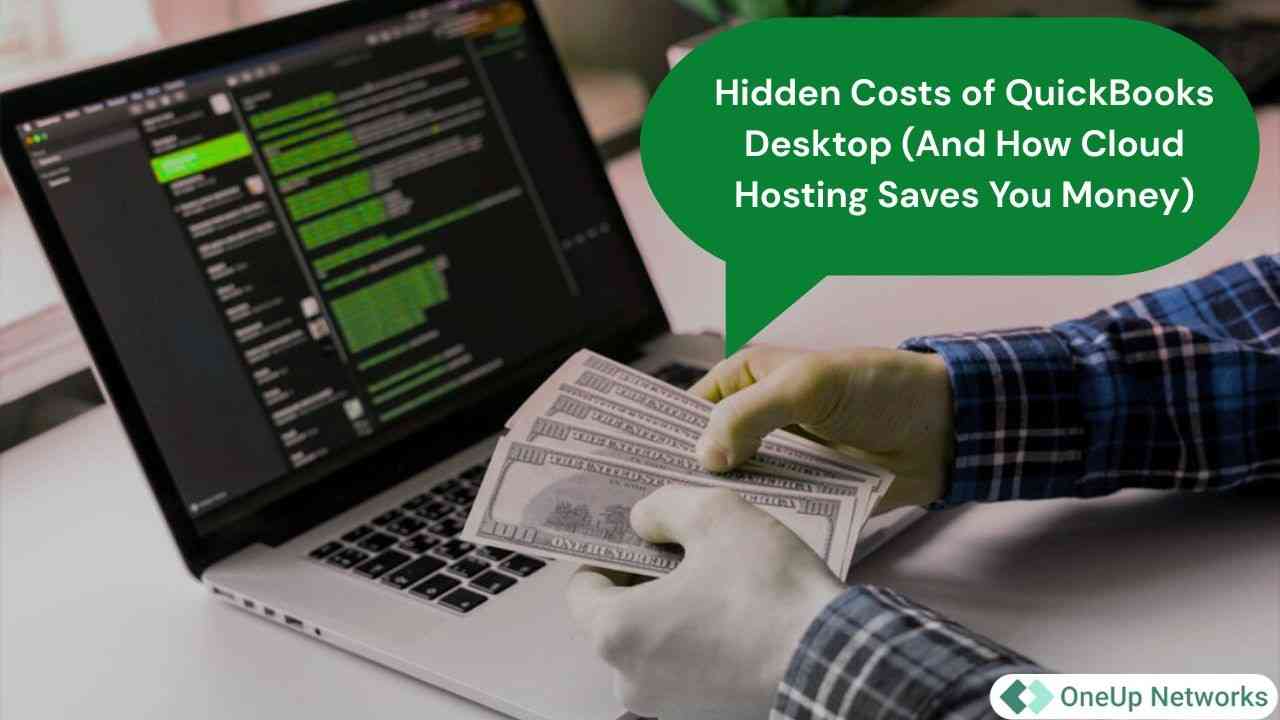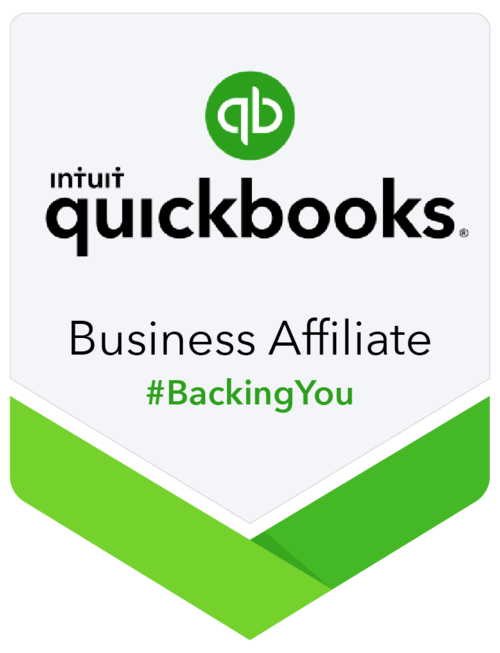Many small and medium-sized businesses rely on QuickBooks Desktop for accounting. On the surface, it seems like a manageable investment; however, beneath the invoice, hidden costs quietly pile up. From surprise upgrade fees to IT maintenance, downtime, and add-ons, these expenses can consequently drain thousands of dollars annually, disrupt workflows, and stress your team. Fortunately, cloud hosting with OneUp Networks provides a modern alternative that, in fact, reduces hidden costs, improves accessibility, and keeps your business running smoothly. In this guide, we’ll therefore break down the hidden costs of QuickBooks Desktop, show their financial impact, and provide a step-by-step roadmap to move to the cloud with confidence.
In this guide, we’ll also uncover these hidden costs and explain how cloud hosting can save money, improve accessibility, and make your accounting processes more efficient—from beginner users to finance professionals.
What Are Hidden Costs in QuickBooks Desktop?
Hidden costs are unplanned expenses that catch SMBs off guard, such as software updates, ongoing IT maintenance, downtime, and extra add-ons that weren’t clear at purchase. Most users underestimate these ongoing charges, which can quickly outpace the original software price. Common hidden costs include:
- Frequent upgrades: Critical for security and new features, but often require paid licenses or technical help.
- IT maintenance: Server upkeep, troubleshooting, and backup solutions—essential, but rarely budgeted upfront.
- Unplanned downtime: Software crashes and hardware failures mean lost hours and missed deadlines.
- Pricey add-ons: Payroll, inventory, and analytics modules often come with separate fees.
1. Licensing and Subscription Costs
The Hidden Expense
QuickBooks Desktop requires separate licenses for each user. Popular editions include:
Pro Plus: $349.99/year
Premier Plus: $549.99/year
Enterprise Solutions: Starting at $1,481/year, with prices increasing based on users and features.
Additionally, hidden fees may include:
- Add-ons like payroll processing, time tracking, and advanced reporting.
- Extra user licenses, often $200–$300 per user annually.
How Cloud Hosting Helps
Cloud-hosted QuickBooks Desktop often bundles licensing into a single monthly fee. Therefore, businesses can scale users up or down without paying upfront costs for additional licenses. This model, as a result, reduces complexity and unexpected fees.
2. Hardware, IT, and Maintenance Costs
The Hidden Expense
Running QuickBooks Desktop locally requires:
- Dedicated servers or high-performance workstations.
- IT staff to troubleshoot issues and perform updates.
- Firewalls, antivirus software, and backup solutions.
Over time, these hardware upgrades, IT support, and maintenance can easily exceed the cost of the software itself.
How Cloud Hosting Helps
Cloud hosting eliminates the need for expensive hardware. The provider, moreover, manages:
- Secure, high-performance servers.
- 24/7 uptime and maintenance.
- Automatic software updates.
This significantly reduces IT overhead and eliminates costly downtime.
3. Data Security and Backup Costs
The Hidden Expense
Data loss is a serious risk with on-premises QuickBooks Desktop. For example:
- Manual backups are prone to errors.
- Cybersecurity threats like ransomware, malware, or theft.
- Compliance requirements for data protection.
Consequently, recovering lost data can be extremely costly and may even halt business operations.
How Cloud Hosting Helps
Cloud hosting providers offer:
- Automated backups stored in multiple locations.
- Advanced encryption and cybersecurity protocols.
- Compliance with industry regulations.
Thus, your financial data stays safe, and disaster recovery is seamless.
4. Remote Access and Collaboration Costs
The Hidden Expense
QuickBooks Desktop is traditionally limited to office computers. Therefore:
- Remote access often requires VPNs or remote desktop setups.
- Employee collaboration is harder without centralized access.
Costs here include technical support, VPN licensing, and training for remote access tools.
How Cloud Hosting Helps
Cloud-hosted QuickBooks Desktop, on the other hand, is accessible from anywhere, on any device, at any time. Teams can, therefore, collaborate in real time, boosting productivity while reducing remote access overhead.
5. Software Updates and Maintenance
The Hidden Expense
QuickBooks Desktop updates are manual. Specifically:
- You must download and install updates.
- Updates may cause compatibility issues with existing workflows.
- IT support may be needed to troubleshoot errors.
How Cloud Hosting Helps
Cloud providers automatically manage updates, ensuring that:
- You have access to the latest features without downtime.
- Security is enhanced with the latest patches.
- IT workload and support costs are, therefore, reduced.
6. Total Cost of Ownership (TCO) Comparison
| Expense Category | On-Premise QuickBooks Desktop | Cloud Hosting QuickBooks |
|---|---|---|
| Licensing Fees | $349.99–$1,481+/year | Included in monthly fee |
| Hardware & IT | $500–$2,000+/year | Included in monthly fee |
| Data Security & Backup | $200–$500+/year | Included in monthly fee |
| Remote Access | $100–$300+/year | Included in monthly fee |
| Software Updates | $100–$300+/year | Included in monthly fee |
| Total Estimated TCO | $1,249.99–$4,581+/year | $500–$1,500/year |
By moving to cloud hosting, businesses can, in fact, cut costs by 40–60%, gain flexibility, and reduce risks associated with downtime and data loss.
7. Why Cloud Hosting is the Smarter Choice
Benefits include:
- Predictable monthly pricing without surprise costs.
- Increased productivity with remote access and collaboration.
- Enhanced data security and compliance.
- Minimal IT overhead and no hardware investments.
- Scalability to grow with your business.
Therefore, cloud hosting transforms QuickBooks Desktop from a costly on-premise solution into a flexible, modern, and cost-effective tool.
The Iceberg of Hidden Costs
Think of QuickBooks Desktop like an iceberg. The visible cost—the license fee—is just the tip. Beneath the surface, however, lurk IT maintenance, software updates, add-ons, downtime, and more. Many business owners only notice these costs once they start accumulating.
Our Client’s Example:
Sarah, a local bakery owner, thought QuickBooks Desktop was a bargain—until, after all, surprise update fees and hours of downtime pushed her monthly costs far above her budget.
QuickBooks Desktop vs Cloud Hosting: Key Benefits
| Feature | QuickBooks Desktop | Cloud Hosting |
|---|---|---|
| Upfront Cost | High | Lower / Subscription |
| IT Maintenance | Frequent & expensive | Managed & included |
| Downtime Risk | High | Minimal |
| Add-On Fees | Often separate | Transparent or included |
| Data Backup | Manual | Automatic & secure |
| Remote Access | Limited | Anywhere, any device |
Step-by-Step Guide to Moving QuickBooks Desktop to the Cloud
- Audit Your Current Expenses: First, track all QuickBooks Desktop costs, including IT, add-ons, and downtime.
- Compare Cloud Hosting Providers: Next, look for specialists in QuickBooks Desktop hosting with strong security, support, and compliance.
- Get a Quote and Trial: Therefore, evaluate predictable monthly pricing and included services.
- Migrate Your Data Safely: Use provider assistance to transfer files securely.
- Test and Train: Ensure workflows function correctly and staff are trained for cloud access.
- Monitor Savings: Finally, compare monthly and annual costs to measure the tangible benefits.
Quantifying the Impact: A Typical Small Business
| Expense Category | QuickBooks Desktop (Annual) | Cloud Hosting (Annual) | Potential Savings |
|---|---|---|---|
| License Renewal | $500–$1,500 | Included | $500–$1,500 |
| IT Maintenance & Hardware | $1,000–$2,500 | Managed | $1,000–$2,500 |
| Add-Ons & Integrations | $500–$1,500 | Often included | $500–$1,500 |
| Downtime / Productivity Loss | High (variable) | Minimal | Significant |
| Total Estimated Cost | $2,000–$5,500+ | $500–$1,500 | 40–60% savings |
Survey data shows that, in fact, 68% of SMBs report unexpected software costs impacting budgets. Cloud hosting, therefore, helps regain control.
FAQ: QuickBooks Desktop Hidden Costs
QuickBooks Desktop’s hidden costs include surprise software updates, ongoing IT maintenance, downtime losses, and extra fees for add-ons—all adding up beyond the initial price.
Each required update may, consequently, involve new licensing, consultant fees, or data migration tasks, which increases annual costs without warning.
Because businesses must maintain local servers, perform regular backups, and troubleshoot issues themselves or hire IT support, adding significant unplanned expenses.
Cloud hosting centralizes IT, offers predictable subscriptions, includes automatic backups/updates, and, therefore, drastically lowers the risk of slowdown or service interruptions.
Downtime caused by crashes, hardware issues, or updates can, after all, halt business functions, rack up lost productivity, and even threaten data security.
For CPA Hosting, most modern cloud providers, in fact, offer end-to-end migration support, ensuring quick, secure, and disruption-free moves with minimal learning curve for teams.
Conclusion
QuickBooks Desktop’s hidden costs—like unplanned updates, IT maintenance, and downtime—can quickly escalate, jeopardizing predictable budgets and operational efficiency. Migrating to QB cloud hosting consequently puts you back in control by providing transparent pricing, automatic updates, and seamless support, so your business can focus on growth, not troubleshooting software surprises.
While QuickBooks Desktop is powerful, the hidden costs can, however, quickly add up—from licenses, hardware, and IT support to data security and downtime. Cloud hosting, therefore, mitigates these costs, offering:
- Savings on software and IT expenses.
- Improved collaboration and remote access.
- Peace of mind with automatic backups and advanced security.
For businesses serious about efficiency, scalability, and cost savings, cloud-hosted QuickBooks Desktop is, indeed, the future.
Tired of hidden costs, constant updates, and IT headaches with QuickBooks Desktop?
At OneUp Networks, we help businesses like yours eliminate unnecessary expenses, improve accessibility, and secure financial data with our fully managed QuickBooks cloud hosting solutions. Our hosting platform is built for performance, reliability, and peace of mind — so you can focus on growing your business while we handle the tech. Whether you’re an accountant, a business owner, or part of a finance team, we make it simple to move to the cloud and start saving from day one.
Take the next step today and experience the OneUp difference:
- Contact Us – Talk to our cloud specialists to find the best QuickBooks hosting plan for your business needs.
- Book a Demo – See how fast, secure, and seamless QuickBooks runs on the OneUp cloud.
- Start Your Free Trial – Try our QuickBooks cloud hosting completely risk-free.
- Chat with an Expert – Have questions? Get instant, personalized advice from our certified QuickBooks hosting experts — available to guide you every step of the way.
Start your cloud journey with OneUp Networks today!
Also Check Out These Related Articles:
- Thomson Reuters Fixed Assets CS Hosting
- The Hidden Costs of Sticking with QuickBooks Enterprise Desktop: Why Cloud Hosting is Cost-Effective!
- QuickBooks Desktop vs. QuickBooks Online vs. QuickBooks Hosting
- Top 8 Cost Benefits Of Switching To QuickBooks Cloud Hosting
- UltraTax Virtual Office CS Downtime Fixes: Key Strategies for Tax Professionals




































